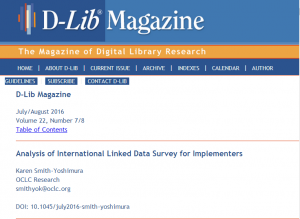 D-Lib Magazine has just published my analysis of the 2015 International Linked Data Survey for Implementers.* I published the results of the 2014 linked data survey in a series of blog posts here between 28 August 2014 and 8 September 2014 (1 — Who’s doing it; 2 — Examples in production; 3 — Why and what institutions are consuming; 4 — Why and what institutions are publishing; 5 — Technical details; 6 — Advice from the implementers). Discussions with OCLC Research Library Partners metadata managers prompted these surveys, as they thought there were more linked data projects that had been implemented than they were aware of.
D-Lib Magazine has just published my analysis of the 2015 International Linked Data Survey for Implementers.* I published the results of the 2014 linked data survey in a series of blog posts here between 28 August 2014 and 8 September 2014 (1 — Who’s doing it; 2 — Examples in production; 3 — Why and what institutions are consuming; 4 — Why and what institutions are publishing; 5 — Technical details; 6 — Advice from the implementers). Discussions with OCLC Research Library Partners metadata managers prompted these surveys, as they thought there were more linked data projects that had been implemented than they were aware of.
I had two objectives for repeating the 2014 survey in 2015:
- Increase survey participation, especially by national libraries.
- Identify changes in the linked data environment, as described in my 1 June 2015 posting, What’s changed in linked data implementations?
We met the first objective. Few national libraries were represented in the 48 responding institutions to the 2014 survey (those that had implemented or were implementing linked data projects or services), and several commentators noted their absence. To address this gap, we conducted the 2015 survey earlier, between 1 June and 31 July (rather than 7 July and 15 August in 2014). We were also more pro-active in recruiting responses. We indeed had increased participation, receiving responses from 71 institutions that had implemented or were implementing linked data projects or services, including 14 from national libraries (compared to just 4 in 2014). The number of projects described also increased, from 76 in 2014 to 112 in 2015.
The idea that we could compare responses to the same set of questions to identify changes or trends proved to be unrealistic for three reasons:
- Although I asked each responding institution in 2014 to also respond to the 2015 survey, only 29 did so. This is too small a pool to provide any over-arching “changes in the linked data environment.”
- One year is insufficient to note significant changes.
- Although repeat respondents had access to their responses in 2014, a number of their 2015 responses differed in areas that were not likely to change within a year (such as licenses, platforms, serializations, vocabularies used). It was unclear whether they really represented a change or just a different answer.
It is easier to note what did not change between the two surveys. For example:
- Most linked data projects or services both consume and publish linked data. Those that publish linked data only (and not consume it) are relatively few in both survey results.
- The chief motivations for publishing linked data are the same: expose data to a larger audience on the Web and demonstrate what could be done with datasets as linked data (80% or more of all respondents in each survey).
- Similarly, the chief motivations for consuming linked data are the same: provide local users with a richer experience and enhance local data by consuming linked data from other sources (74% or more of all respondents in each survey).
- Most respondents in each survey were libraries or networks of libraries. We had few responses from outside the library domain. In hindsight this is not surprising, as our social networks are with those who work in, for or with libraries
The 2015 survey results may be considered a partial snapshot of the (mostly) library linked data environment. Museums and digital humanities linked data projects are not well represented. I have been asked whether I plan to repeat the survey. I haven’t decided – what do you think?
If you’re interested in looking at the responses from institutions you consider your peers, or would like to analyze the results for yourself, all responses to both the 2015 and 2014 surveys (minus the contact information which we promised to keep confidential) are available at: http://www.oclc.org/content/dam/research/activities/linkeddata/oclc-research-linked-data-implementers-survey-2014.xlsx
* Full citation: Smith-Yoshimura, Karen. 2016. Analysis of International Linked Data Survey for Implementers. D-Lib Magazine 22 (7/8) doi:10.1045/july2016-smith-yoshimura
Karen Smith-Yoshimura, senior program officer, topics related to creating and managing metadata with a focus on large research libraries and multilingual requirements. Karen retired from OCLC November 2020.